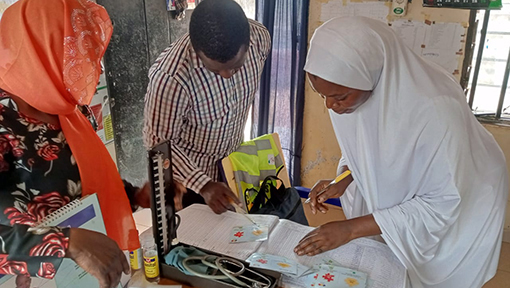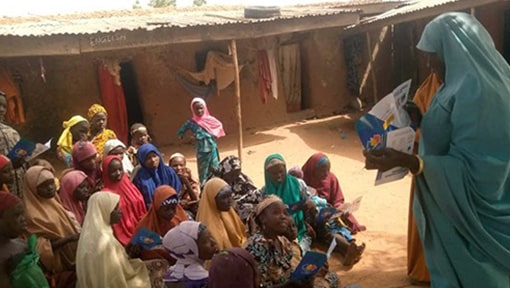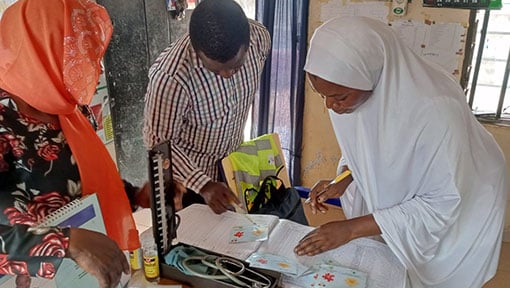ASHAs Recognized in Kanpur for Promoting Male Family Planning Methods

ASHAs in Kanpur conducting a Chauraha meeting.
Contributors: Meenakshi Dikshit, Anil Kumar Dwivedi, Pranav Jha
Family planning benefits both partners in a relationship and either partner can adopt a suitable method to space or limit their family size. However, the responsibility disproportionately falls on the woman. The Government of India recognizes the role men play as family planning champions, supports and users. While Uttar Pradesh’s city health administration has promoted non-scalpel vasectomy (NSV) through a designated NSV day every month on the 21st, very few men show up. The city of Kanpur has faced the same issue, year after year.
To address this, The Challenge Initiative for Healthy Cities (TCIHC) in India launched an innovative “male engagement strategy” in January 2019 to promote male family planning methods, condoms and NSV. Under this innovation, urban accredited social health activists (ASHAs) are coached and mentored by a Male Engagement Team Leader (METL) on approaching men with family planning messages. The approach includes going where men congregate such as a “chauraha” (a Hindi word meaning crossroads in English), evening meeting points, workplace interventions, etc. The approach also targets specific populations, like rickshaw pullers, who are among those most likely to believe myths related to male methods. In addition, the approach includes counseling men during ASHA home visits.
As a result of adopting this strategy, nine of Kanpur’s ASHAs were recognized on World Population Day (WPD) – July 11, 2019 – by the government for their efforts in identifying potential NSV clients and referring them to services. This strategy helped Kanpur become second in the state for most NSVs. On WPD alone, 155 NSVs were performed compared to 75 NSVs performed during WPD 2018.
“We found that majorly there were two issues why men didn’t seek family planning services; first, family planning is perceived as women’s responsibility as they give birth and second, there are multiple myths, misconceptions and social taboos around NSV,” said one of the recognized ASHAs, who motivated 17 men for NSV. “During our household visits, we counseled couples on the benefits of NSV and eradicated myths associated with male sterilization.”
The following details how TCIHC prepared Kanpur’s ASHAs to engage men:
- TCIHC organized a two-day classroom coaching for ASHAs on family planning methods, including male methods, their administration timelines, side effects and incentives related to them as per various government schemes.
- The METL demonstrated chauraha meetings to Field Program Associates (FPAs) and Field Program Coordinators (FPCs) and ASHAs. An ASHA either visits with a FPC/FPA or another ASHA so she is not alone at the chauraha meeting. This buddy system ensures her comfort.
- After four to five such demonstration meetings, ASHAs conduct meetings in a similar manner in the presence of FPC/FPA or METL to build their confidence and reduce hesitation. During any such meetings, ASHAs distribute brochures on NSV. At the time of these meetings, ASHAs identify men in their area and share with METL for planning home visits.
- METLs do joint home visits with ASHAs for counseling men along with or in the presence of their wives for adopting family planning.
- Post-counseling, interested clients are referred to nearby government or accredited private facilities, which provide male family planning services.
- Once the male client reaches the facility, they are counseled again by the staff nurse/provider on method choice so that they can make an informed decision. On agreeing to a method, consent is taken and documented.
- In this entire process, ASHAs are also helped by the National Urban Health Mission (NUHM) coordinators in the field, especially related to providing appropriate referrals to facilities.
This coaching and mentoring model provided relevant talking points to ASHAs to address any awkward queries that they might face while counseling men to adopt a family planning method, and made them confident enough to take up chauraha meetings on their own. Moreover, the recognition of these nine ASHAs motivated others. The city administration has noted the difference made by the METL in coaching ASHAs on the male engagement strategy.
Although there was skepticism of the approach, the results are irrefutable. The Additional Chief Medical Officer and Nodal NUHM Kanpur explains,
“ASHAs are women and mostly interact with women. Initially, we were not comfortable that they visit chauraha and talk with men on such a sensitive issue, but they have done a commendable job and have given result,” said the Additional Chief Medical Officer and Nodal NUHM in Kanpur. “Thanks to continuous coaching and mentoring provided to them by TCIHC.”
Just seven months after its roll out, the male engagement strategy is now functional in 20 TCIHC-supported cities across Uttar Pradesh. The city data of Kanpur shows a 245% jump in the number of NSV acceptors from 47 in April-June 2018 to 162 in April-June 2019.






